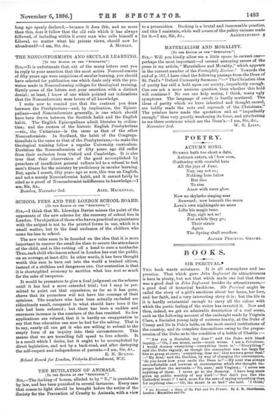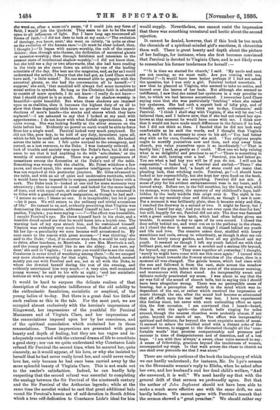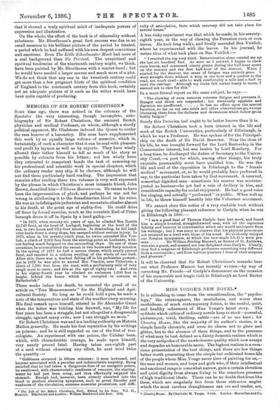BOOKS •
SIR PERCIVAL!
Tins book wants substance. It is all atmosphere and im- pression. That which gave John Inglesant its attractiveness is here in plenty, but not that which made one feel that there was a good deal in John Inglesant besides its attractiveness,— a good deal of historical backbone. Sir Percival might be called the story of a girl's emotions about her home, her love, and her faith, and a very interesting story it is ; but the life in it is hardly substantial enough to carry all the colour with which the poetic feeling of the writer has invested it. Now and then, indeed, we get an admirable description of a real scene, such as the following account of the onslaught made by Virginia Clare, a Socialist young lady of extreme beauty, at the Duke of Cressy and De la Pole's table, on the most sacred institutions of the country, and its complete discomfiture owing to the prepos- session of the Duke as to the condition of a bottle of Chablis :— "' Are you a Socialist, my dear ?' said the Duke with bland inquiry.—' Oh, I am worse, uncle—much worse. I am a Petroleuse. I would destroy everything—everything there is.'—' Everything !' said the Duke vaguely, as though the conception was too large for him to grasp at once; everything, dear me! that seems a great deal.'
My dear,' said the Duchess, by way of changing the conversation,
'do you know how your uncle the Dean is aunt was always uncomfortable and nervous at conversation which she thought im- proper before the servants.—' No, aunt,' said Virginia ; I never see anything of them. I never go to the Deanery. I have long since given up public worship of any kind.'—' But don't you like the Cathedral music ?' I said, more for the sake of saying something than for anything else.= Oh, the music is so bad !' she said. ' I think, • sir Pyroiyal : a Story of the Past and the Present. By I. H. Shortkolue. London Maamillan and CO. she *ant on, after a mom ant's pause, if I could join any form of faith, I would join the Quakers. They seem to me to be the most open to all influences of light. But I have long ago renounced all forms of faith.'—I did not dare to look at my aunt.—' The evolution of theology, von know, aunt,' she went on calmly, 'is quite as clear as the evolution of the human race.'—(It must be clear indeed, then, I thought.)—' It began with nature-worship, the cult of the cosmic deities ; then through scio.theism, the deification of ancestral ghosts or ancestor-worship ; then through fetishism and totemism to the present state of intellectual shadow-worship.'—I did not know then, but she told me a day or two afterwards, that she had been reading in the train as she came down an article by one of the leading scientists of the day. She lent me the magazine, and, as far as I could understand the article, I fancy that she had got, as Lord Clare would have said, ' a little mixed' No one seemed able to grapple with the ancestral ghosts, so she had the conversation all to herself.—' I suppose,' she said, that mankind will always find some incentive to moral action in symbols. So long as the Christian faith is admitted to consist of mere symbols, I do not know—I really do not know— that I should object to it so much. Some of its shadow-worship is beautiful—quite beautiful. But when these shadows are imposed upon ns as realities, then it becomes the highest duty of us all to show that these dogmatic idols have no greater value than the pro- ductions of men's hands—the stocks and atones which they have replaced.'—I am ashamed to say that I looked at my aunt with apprehension ; I do not know with what foolish apprehension. I was quite wrong. She was looking fixedly at the silver sconces on the table before her. Evidently no power on earth would be able to force from her a single word. Percival looked very much perplexed. He did not like, poor boy, to be told of any duty, incumbent upon all, which he felt he could not understand or sympathise with. He looked across the table at me. I felt quite unequal to the emergency, and turned, as a last resource, to the Duke. I was instantly relieved. A look of trouble and anxiety was upon the Duke's face, but it did not seem to me that it had anything to do with scio-theism,' or the worship of ancestral ghosts. There was a general appearance of uneasiness among the domestics at the Duke's end of the table. Something was wrong with the chablis. Mr. Priest withdrew a few paces, and stood apart, like some superior intelligence whose advice was not required at this particular juncture. Mr. Giles advanced to the table, and with an air of quiet and unobtrusive rectitude, which it would have been impossible to surpass, presented his Grace with a cork. The Duke took it—looked at one end for some moments very attentively ; then be turned it round and looked for the same length of time, and with equal care, at the other end. Then he returned it to Giles with a gesture of superb resignation, as though he had said :
I accuse no one ; I blame no one. It is inexplicable; but let it pass —let it pass. We will return to the ordinary and trivial avocations of life.' He turned to us, and, evidently perceiving that Virginia was dominating the conversation, addressed himself to her.—' I beg your pardon, Virginia ; you were saying — ?'—The effect was irresistible. I caught Percival's eye. He threw himself back in his chair, and a horrible dread seized me that he would burst into a boyish roar. The warning look of my eyes struck him, and he restrained himself. Virginia was evidently very much vexed. She flushed all over, and bit her lip—a peculiarity we soon became well accustomed to. My aunt came to the rescue with great success.—` I was thinking,' she said to the Duke, that, if to-morrow were fine, it would be very nice to drive, after luncheon, to Merrivale. I owe Mrs. Merrivale a call, and the young people would like to see the abbey. I am sure, my dear,' she said to Virginia ; ' I am sure you would like to see the ruins. Constance is never tired of wandering among them.'—So we escaped any more shadow-worship for that night. Virginia, indeed, seemed mostly put out with Percival and me, not at all with the Duke, to whom she devoted herself during the rest of the evening, and evidently entertained him very mach.—`A very nice, well-mannered young woman,' he said to his wife at night ; ' and her socialistic notions sit with a very pretty quaintness upon her.' "
It would be hard to surpass the delicate realism of that description of the complete indifference of the old nobility to the enthusiastic fanaticism, socialistic or sceptical, of the young ladies of to-day. But there is a great deal too little of such realism as this in the tale. For the most part, we are occupied almost exclusively with the heroine's impressions of Kingswood, her impressions of the youthful Sir Percival Massareen and of Virginia Clare, and her impressions of the renunciations imposed upon her by her conscience, and of the spiritual consolation which sustained her in those renunciations. These impressions are presented with great beauty and depth of feeling, but they are too vague and in- adequately connected with the external drama of life to constitute a good story ; nor can we quite understand why Constance Lisle refused Sir Percival the second time, when he assured her, quite sincerely, as it would appear, of his love, or why she insisted to herself that he had never really loved her, and could never really love her, only because he had once been carried away by the more splendid beauty of Virginia Clare. This is not made out to the reader's satisfaction. Indeed, he can hardly help suspecting that the second refusal was essential to completing the analogy between the Sir Percival of the nineteenth century and the Sir Percival of the Arthurian legends ; while at the same time the novelist wished to cast that great additional halo round Sir Percival's heroic act of self-devotion in South Africa which a true self-dedication to Constance Lisle's ideal for him would supply. Nevertheless, one cannot resist the impression that there was something unnatural and hectic about the second rejection.
It cannot be denied, however, that if this book be too much the chronicle of a spiritual-minded girl's emotions, it chronicles them well. There is great beauty and depth about the picture of her feelings, for instance, when she first becomes convinced that Percival is devoted to Virginia Clare, and is not likely even to remember his former tenderness for herself :—
" 'It is time we started for church,' I Raid. 'My uncle and aunt are not coming, so we must walk. Are you coming with me Percival ?'—It would have been better perhaps if I had not asked the question, but I was only a girl. Percival looked uncertain. I saw that be glanced at Virginia, who seemed to take no notice, and turned over the leaves of her book. But although she seemed so indifferent, I saw that she raised her eyebrows in a way peculiar to• her, to which we had become accustomed. I remember Lord Clare saying once that she was particularly ' fetching' when she raised her eyebrows. She had such a superb look of lofty pity, and of friendly, arch contempt.—' I think not to-day, Constance,' said Percival. I think I shall stay with Virginia, if she will let me—It believed then, and I believe now, that if she had not raised her eye- brows at that moment he would have come with me. I think now that it would not have made much difference in the future if he had, but I did not think so then. I fancied that he did not look very comfortable as he said the words, and I thought that Virginia saw it, and felt it necessary to come to his aid.—' You had better
stay with us for once, Constance,' she said. You religious people ought to mortify yourselves now and then, and stay away from church, you value yourselves upon it so inordinately.'—' That is hardly fair,' I said, as gently as I could. ' How can we help valuing. what is so delightful and precious to us ?'—' There is something in
that,' she said, turning over a leaf. Percival, you had better go. You see what a bad boy you will be if you do not. I will not be responsible.'—I looked up at Percival and smiled.—' There !' she said, turning another leaf, ' a heart of stone could not resist that pleading look, that witching smile. Percival, go !'—I should have looked at her reproachfully, but she kept her eyes fixed on the book, though she seemed to see everything. Percival did not stir. A sense of pity for his evident embarrassment rose in my hears, and I turned away. Before me, in the full sunshine, lay the long wall, with. its strange, worn tracery, the mystery of my childhood's days, half- hidden by the leafy tendrils that crept over it. The sight is im- pressed on my memory clear and distinct, as though I saw it now. For a moment it was brilliantly plain, then it became misty and dim.. I reached the doorway in a second or two. It might be fancy, but I thought I heard her say, And you do not even open the door for her,' but still, happily for me, Percival did not stir. The door was fastened with a great antique iron latch, which had often before given me- trouble. It seemed to-day to open of its own accord. I closed the- door softly behind me, and went out on to the pathway in the chase. As I closed the door it seemed as though I closed behind me youth and life and love. The massive oaken door, studded with heavy stanchions and nails, swung to relentlessly, as though it shut me out. from the lovely sunny garden, and from all my girlhood and my youth. It seemed as though I left my youth behind me with that brilliant pair, and chose at once a sombre and a serious life beyond', far beyond, my years. They were together all yesterday,' I thought, 'surely he might have come with me this once again' I turned with a sinking heart towards the flowery stretches of the chase, then in a moment all was changed. The gentle breeze, which had risen with the sun and followed it from the east, stole across the meadow flowers and the grass, laden with the scent of the summer morning,. and murmurous with distant sound. An inexpressibly sweet and delicate melody penetrated my sense. I was about to say that the air was full of the sound of church bells, but in saying this I should' have been altogether wrong. There was no perceptible sense of hearing, but a perception of melody in the mind which was in- dependent of the ear, or rather which received the impression of- music through the ear, after the sound had become so attenuated that all effect upon the ear itself was lost. I have experienced this feeling since, but never with such enthralling effect as upon this, the first occasion. I am convinced that I heard—beard,. that is, with the spirit—the church bells ringing for miles around, though the nearest churches were probably almost, if not quite, beyond the reach of ear. The effect was inexpressibly spiritual and delicate, far beyond the most exquisite music of sense.. It seemed to solace the troubled mind with a distant echo of the music of heaven, to suggest to the distracted thought all the ' com- fortable words' that promise companionship and presence and' succour in time of disappointment and of desertion, and of a lost hope. ' I am with thee always,' a sweet, clear voice seemed to say.. A sense of fellowship, gracious beyond the tenderness of women, accompanied my steps. In that walk across the chase to church no one shall ever persuade me that I was alone."
There are certain portions of the book the inadequacy of which we can hardly understand ; for instance, Mr. De Lys's sermon on the Shunamite woman's reply to Elisha, when he asked after her own, and her husband's and her dead child's welfare, "And she answered, it is well." We need hardly say that with the general drift of that sermon we profoundly agree. But that the author of John Inglesant should not have been able to make a much more effective one with the same drift, we can hardly believe. We cannot agree with Percival's remark that the sermon showed a " great preacher." We should rather say
that it showed a truly spiritual mind of inadequate powers of expression and illustration.
On the whole, the effect of the book is of ethereality without substance, Mr. Shorthouse's great first success was due in no small measure to his brilliant picture of the period he treated, a period which he had suffused with his own deepest convictions and emotions. Even The Little Schoolmaster Mark had more of a real background than Sir Percival. The unspiritnal and spiritual tendencies of the nineteenth century might, we think, have been painted by Mr. Shorthouse with a master-hand ; but he would have needed a larger canvas and much more of a plot. We do not think that any one in the twentieth century could get more than a few pregnant hints of the spiritual condition of England in the nineteenth century from this book, certainly not an adequate picture of it such as the writer would have been quite capable of producing.
















































 Previous page
Previous page